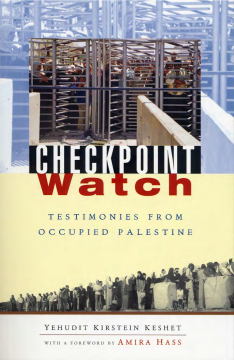
Additional Information
Book Details
Abstract
This book is a critical exploration of Israel's curfew-closure policy in the Occupied Palestinian Territories through the eyes of CheckpointWatch, an organization of Israeli women monitoring human rights abuses. The book combines observers' daily reports from the checkpoints and along the Separation Wall, with analysis of the bureaucracy that supports the ongoing occupation. Keshet demonstrates the link between Israeli bureaucracy and the closure system as integral to a wider project of ethnic cleansing.
As co-founder of the group, Keshet critically reviews the organisation's transformation from a feminist, radical protest movement to one both reclaimed by, and reclaiming, the consensus. Illustrating the nature of Israeli mainstream discourse as both anodyne and cruel, the book also analyses Israeli media representation of Checkpoint Watch and human rights activism in general. Keshet contends that the dilemmas of these Israeli women, torn between opposition to the Occupation and their loyalty to the state, reflects political divisions within Israel society as a whole.
Yehudit Kirstein Keshet was born in Wales and has lived in Israel since the late fifties, settling there permanently in 1974.
'This important book offers an insightful perspective of the system of Israeli military checkpoints and blockades in the West Bank, their devastating impact on the Palestinian population, and the arbitrary use of a control mechanism for reasons which often have little to do with security considerations. The first-hand accounts and observations of the Watchers - Israeli women from all walks of life - also provide an interesting insight into how different sectors of Israeli society see - or fail to see - the impact of such a system and its injustices'
Donatella Rovera, Researcher on Israel and the Occupied Territories, Amnesty International
'It is impossible to guess when and how the harsher Israeli version of the Apartheid Pass System will collapse. When it does, CheckpointWatch will have had an important role in its collapse'.
Amira Hass
Table of Contents
| Section Title | Page | Action | Price |
|---|---|---|---|
| Cover | Cover | ||
| Contents | v | ||
| Maps | vii | ||
| Acknowledgements | viii | ||
| Foreword by Amira Hass | x | ||
| Introduction | 1 | ||
| Borders and boundaries | 2 | ||
| A political awakening | 3 | ||
| 1948 and after | 5 | ||
| The book | 7 | ||
| Notes | 8 | ||
| 1 | Occupation | 11 | ||
| Checkpoint policy | 13 | ||
| A glossary of oppression | 14 | ||
| Bureaucracy | 17 | ||
| The mechanism of oppression | 20 | ||
| Jerusalem | 24 | ||
| Notes | 28 | ||
| 2 | Bearing witness | 31 | ||
| Witnesses to the Occupation | 35 | ||
| Practices and tactics | 37 | ||
| A case of conscience | 39 | ||
| ‘We dwell among our own people’ | 43 | ||
| The modesty of witnessing | 46 | ||
| Notes | 49 | ||
| 3 | The Gateway to Hell | 55 | ||
| Checkpointspeak | 60 | ||
| A people’s army | 63 | ||
| An ‘invisible’ people | 70 | ||
| The banality of evil | 75 | ||
| Days of violence | 80 | ||
| Notes | 86 | ||
| 4 | The Annexation Wall | 89 | ||
| The story of Jabarra | 91 | ||
| ‘O Jerusalem! Our feet are standing (outside) your gates!’ | 95 | ||
| Demography is geography | 101 | ||
| Notes | 103 | ||
| 5 | Dilemmas of witnessing | 107 | ||
| Humanitarianism versus political activism | 110 | ||
| Protest or resistance | 112 | ||
| An uneasy alliance | 116 | ||
| The silver platter | 117 | ||
| The perpetrators as victims | 120 | ||
| Between solidarity and patronage | 122 | ||
| Notes | 130 | ||
| 6 | Representation | 132 | ||
| A love–hate relationship | 132 | ||
| The media | 134 | ||
| In conclusion | 145 | ||
| Notes | 148 | ||
| 7 | Conclusion | 150 | ||
| Looking back | 150 | ||
| Looking forwards | 152 | ||
| The last word | 154 | ||
| Note | 155 | ||
| Appendix I: Checkpoints observed, 2001–05 | 156 | ||
| Appendix 2: Complaints filed in 2004 | 163 | ||
| Appendix 3: Monthly Digest, November 2004 | 165 | ||
| Machsomwatch observations during November 2004 | 165 | ||
| References | 170 | ||
| Index | 176 |
